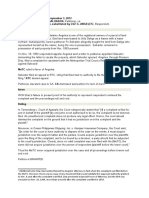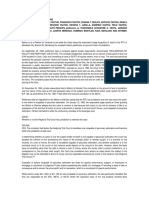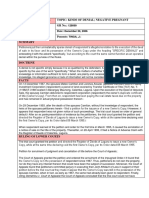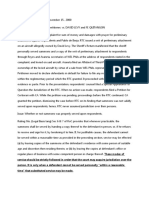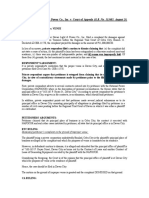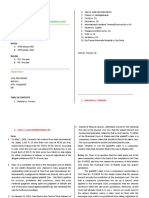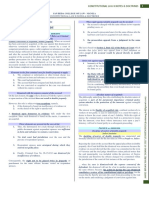100%(2)100% found this document useful (2 votes)
516 viewsFlores V Mallere-Philipp 144 SCRA 377
Flores V Mallere-Philipp 144 SCRA 377
Uploaded by
Vic Rabaya(1) Flores sued Binongcal and Calion separately in the RTC to collect debts for truck tires purchased on credit. Binongcal's debt was P11,643 while Calion's was P10,212.
(2) Binongcal argued the RTC lacked jurisdiction over the case against him alone, as the amount was below the RTC's threshold of P20,000. However, the RTC ruled it had jurisdiction when considering the total debt (P11,643 + P10,212).
(3) The Supreme Court affirmed, noting that under the new totality rule, separate claims against different defendants can be aggregated to determine jurisdiction, as long as the claims arise from the same transaction
Copyright:
© All Rights Reserved
Available Formats
Download as DOC, PDF, TXT or read online from Scribd
Flores V Mallere-Philipp 144 SCRA 377
Flores V Mallere-Philipp 144 SCRA 377
Uploaded by
Vic Rabaya100%(2)100% found this document useful (2 votes)
516 views2 pages(1) Flores sued Binongcal and Calion separately in the RTC to collect debts for truck tires purchased on credit. Binongcal's debt was P11,643 while Calion's was P10,212.
(2) Binongcal argued the RTC lacked jurisdiction over the case against him alone, as the amount was below the RTC's threshold of P20,000. However, the RTC ruled it had jurisdiction when considering the total debt (P11,643 + P10,212).
(3) The Supreme Court affirmed, noting that under the new totality rule, separate claims against different defendants can be aggregated to determine jurisdiction, as long as the claims arise from the same transaction
Original Description:
Flores v Mallere-Philipp 144 SCRA 377
Original Title
Flores v Mallere-Philipp 144 SCRA 377
Copyright
© © All Rights Reserved
Available Formats
DOC, PDF, TXT or read online from Scribd
Share this document
Did you find this document useful?
Is this content inappropriate?
(1) Flores sued Binongcal and Calion separately in the RTC to collect debts for truck tires purchased on credit. Binongcal's debt was P11,643 while Calion's was P10,212.
(2) Binongcal argued the RTC lacked jurisdiction over the case against him alone, as the amount was below the RTC's threshold of P20,000. However, the RTC ruled it had jurisdiction when considering the total debt (P11,643 + P10,212).
(3) The Supreme Court affirmed, noting that under the new totality rule, separate claims against different defendants can be aggregated to determine jurisdiction, as long as the claims arise from the same transaction
Copyright:
© All Rights Reserved
Available Formats
Download as DOC, PDF, TXT or read online from Scribd
Download as doc, pdf, or txt
100%(2)100% found this document useful (2 votes)
516 views2 pagesFlores V Mallere-Philipp 144 SCRA 377
Flores V Mallere-Philipp 144 SCRA 377
Uploaded by
Vic Rabaya(1) Flores sued Binongcal and Calion separately in the RTC to collect debts for truck tires purchased on credit. Binongcal's debt was P11,643 while Calion's was P10,212.
(2) Binongcal argued the RTC lacked jurisdiction over the case against him alone, as the amount was below the RTC's threshold of P20,000. However, the RTC ruled it had jurisdiction when considering the total debt (P11,643 + P10,212).
(3) The Supreme Court affirmed, noting that under the new totality rule, separate claims against different defendants can be aggregated to determine jurisdiction, as long as the claims arise from the same transaction
Copyright:
© All Rights Reserved
Available Formats
Download as DOC, PDF, TXT or read online from Scribd
Download as doc, pdf, or txt
You are on page 1of 2
Flores v Mallere-Phillipps that, after a careful scrutiny of the complaint, it
appears that there is a misjoinder of parties for
G.R. No. L-66620 September 24, 1986 the reason that the claims against resps
Binongcal and Calion are separate and distinct
FACTS:
and neither of which falls within its jurisdiction.
Flores sued the respondents for the
The lower court has jurisdiction over the
collection of sum of money with the RTC:
case following the "novel" totality rule
(1) alleged in the complaint was against introduced in Section 33(l) of BP129 and Section
Ignacio Binongcal for refusing to pay the 11 of the Interim Rules.
amount of P11,643 representing cost of
Section 33(l) of BP129:
truck tires which he purchased on credit
from Flores on various occasions from That where there are several claims or
August to October, 1981; causes of action between the same or
different parties, embodied in the same
(2) was against resp Fernando Calion for
complaint, the amount of the demand
allegedly refusing to pay the amount of
shall be the totality of the claims in all the
P10,212 representing cost of truck tires
causes of action, irrespective of whether
which he purchased on credit from pet on
the causes of action arose out of the same
several occasions from March, 1981 to
or different transactions. ...
January, 1982.
Section 11 of the Interim Rules:
Binongcal filed a MTD on the ground of
lack of jurisdiction since the amount of the Application of the totality rule. In actions
demand against said resp was only P11,643.00, where the jurisdiction of the court is
and under Section 19(8) of BP129 the RTC shall dependent on the amount involved, the
exercise exclusive original jurisdiction if the test of jurisdiction shall be the aggregate
amount of the demand is more than P20K. sum of all the money demands, exclusive
only of interest and costs, irrespective of
Although another person, Fernando
WON the separate claims are owned by or
Calion, was allegedly indebted to pet in the
due to different parties. If any demand is
amount of P10,212.00, his obligation was
for damages in a civil action, the amount
separate and distinct from that of the other resp.
thereof must be specifically alleged.
Calion joined in moving for the dismissal of the
complaint. Former rule under Section 88 of the
Judiciary Act of 1948 :
RTC Decision: dismissed the complaint for lack
of jurisdiction. Where there are several claims or causes
of action between the same parties
embodied in the same complaint, the
ISSUE: amount of the demand shall be the totality
of the demand in all the causes of action,
WoN the RTC correctly ruled on the irrespective of whether the causes of
application of the permissive joinder of parties. action arose out of the same or different
transactions; but where the claims or
causes of action joined in a single
complaint are separately owned by or due
HELD: YES, RTC had correctly ruled on the
to different parties, each separate claim
application of the permissive joinder of
shall furnish the jurisdictional test.
parties.
Under the present law, the two cases
The lower court correctly held that
would be under the jurisdiction of the RTC.
the jurisdictional test is subject to the rules on
Similarly, Brillo vs. Buklatan and Gacula vs.
joinder of parties pursuant to Section 5 of Rule 2
Martinez, if the (1) separate claims against
and Section 6 of Rule 3 of the Rules of Court and
the several defendants arose out of the same
transaction or series of transactions and (2)
there is a common question of law or fact,
they would now be under the jurisdiction of the
RTC.
In cases of permissive joinder of
parties, whether as plaintiffs or as defendants,
under Section 6 of Rule 3, the total of all the
claims shall now furnish the jurisdictional test.
Needless to state also, if instead of joining or
being joined in one complaint separate actions
are filed by or against the parties, the amount
demanded in each complaint shall furnish the
jurisdictional test.
DOCTRINE: The following are requisites for a
Joinder of Parties, Sec. 6, Rule 3, Rules of Court:
(1) A right to relief in respect or arising out of
the same transaction or series of transactions;
and
(2) A common question of law or fact.
You might also like
- Blay v. BanaDocument2 pagesBlay v. BanaBea DiloyNo ratings yet
- Domagas v. JensenDocument1 pageDomagas v. JensenAbigail TolabingNo ratings yet
- Palmiano-Salvador V AngelesDocument1 pagePalmiano-Salvador V AngelesMaria100% (2)
- 3 People v. GabrielDocument7 pages3 People v. Gabrieljuan dela cruzNo ratings yet
- 100 - Carpio Vs Rural Bank of Sto TomasDocument1 page100 - Carpio Vs Rural Bank of Sto Tomasdinv100% (1)
- Pantranco v. Standard InsuranceDocument4 pagesPantranco v. Standard Insurancekim_santos_20100% (3)
- Sun Insurance V Asuncion DigestDocument1 pageSun Insurance V Asuncion Digestpj100% (2)
- Russell v. VestilDocument2 pagesRussell v. VestilMaureen CoNo ratings yet
- Ponente: Sereno, J. Facts:: Urban Bank V Pena (2011)Document6 pagesPonente: Sereno, J. Facts:: Urban Bank V Pena (2011)Vic RabayaNo ratings yet
- CredTrans Case Digest#4Document29 pagesCredTrans Case Digest#4Vic RabayaNo ratings yet
- Flores Vs Mallare-PhilippsDocument2 pagesFlores Vs Mallare-PhilippsJanila Bajuyo100% (2)
- Financial Building Corporation v. Forbes Park AssociationDocument2 pagesFinancial Building Corporation v. Forbes Park AssociationMaria Analyn0% (1)
- Sunbanun v. Go, G.R. No. 163280, 2 February 2010, 611 Scra 320 FactsDocument2 pagesSunbanun v. Go, G.R. No. 163280, 2 February 2010, 611 Scra 320 FactsJunelyn T. EllaNo ratings yet
- Marilag V MartinezDocument1 pageMarilag V MartinezDanica Irish Revilla0% (1)
- FIRST AQUA SUGAR TRADERS Vs BPIDocument1 pageFIRST AQUA SUGAR TRADERS Vs BPIArlene DurbanNo ratings yet
- Case 9Document2 pagesCase 9SORITA LAW100% (1)
- Paderanga Vs BuissanDocument2 pagesPaderanga Vs BuissanmelfabianNo ratings yet
- PhilHealth V OLLH DigestDocument3 pagesPhilHealth V OLLH Digestkristinevillanueva100% (1)
- Virra Mall Tenants Association Inc Vs Virra Mall Greenhills AssociationDocument1 pageVirra Mall Tenants Association Inc Vs Virra Mall Greenhills AssociationCarlyn Belle de GuzmanNo ratings yet
- Figueroa v. PeopleDocument1 pageFigueroa v. PeopleElaineMarcilla0% (1)
- Tijam V Sibonghanoy GR No. L-21450Document2 pagesTijam V Sibonghanoy GR No. L-21450Taz Tanggol Tabao-Sumpingan100% (2)
- Danilo v. Pedro, G.R. No. 155736, 31 March 2005Document3 pagesDanilo v. Pedro, G.R. No. 155736, 31 March 2005Jan Airah PrincipeNo ratings yet
- De Joya Vs Judge MarquezDocument2 pagesDe Joya Vs Judge Marquez1925habeascorpus100% (4)
- Intramuros Administration, Petitioner, vs. Offshore Construction Development CompanyDocument7 pagesIntramuros Administration, Petitioner, vs. Offshore Construction Development CompanyMonkeyhead DaconoNo ratings yet
- G.R. No. 129928, 25 August 2005 Misamis Occidental II Cooperative, Inc. v. David FactsDocument2 pagesG.R. No. 129928, 25 August 2005 Misamis Occidental II Cooperative, Inc. v. David FactsChupsNo ratings yet
- Tan Vs CincoDocument1 pageTan Vs Cincojas100% (1)
- Laperal Devt. Corp. vs. CA, 223 SCRA 261 G.R. No. 96354 June 8, 1993Document4 pagesLaperal Devt. Corp. vs. CA, 223 SCRA 261 G.R. No. 96354 June 8, 1993Caleb Josh PacanaNo ratings yet
- Gochan V GochanDocument7 pagesGochan V GochanIvan Montealegre Conchas100% (2)
- Camitan Vs CA: Civil Procedure Topic: Kinds of Denial Negative Pregnant Case Title: GR No.: Date: PonenteDocument4 pagesCamitan Vs CA: Civil Procedure Topic: Kinds of Denial Negative Pregnant Case Title: GR No.: Date: PonenteAngelica Fojas RañolaNo ratings yet
- Ortigas Vs Velasco Case DigestDocument6 pagesOrtigas Vs Velasco Case DigestBea CadornaNo ratings yet
- Galofa v. Nee Bon Sing - Defenses, Judgment On The PleadingsDocument2 pagesGalofa v. Nee Bon Sing - Defenses, Judgment On The PleadingsAtty. G100% (1)
- HamiltonDocument2 pagesHamiltonRex RegioNo ratings yet
- Gochan vs. GochanDocument1 pageGochan vs. GochanKenneth Ray Tagle100% (1)
- Agra VS PNBDocument2 pagesAgra VS PNBJerry CaneNo ratings yet
- Corpo - Fabia Vs CADocument2 pagesCorpo - Fabia Vs CAYetteMarg100% (2)
- CGR V Treyes DigestDocument4 pagesCGR V Treyes DigestMartha IlaganNo ratings yet
- Crisostomo B. Aquino vs. Municipality of Malay AklanDocument2 pagesCrisostomo B. Aquino vs. Municipality of Malay AklanJanlo FevidalNo ratings yet
- Remington Industrial Sales Corp. v. CADocument3 pagesRemington Industrial Sales Corp. v. CASophiaFrancescaEspinosaNo ratings yet
- 324 Riviera Golf Club V CCA HoldingsDocument2 pages324 Riviera Golf Club V CCA HoldingsLouis Tan100% (1)
- 4 Madarang Et Al v. Spouses MoralesDocument1 page4 Madarang Et Al v. Spouses MoralesAntonJohnVincentFriasNo ratings yet
- Radiowealth Finance Company VS Del Rosario Case DigestDocument1 pageRadiowealth Finance Company VS Del Rosario Case DigestjasNo ratings yet
- PEREZ (Civpro) - Decena vs. PiqueroDocument1 pagePEREZ (Civpro) - Decena vs. PiqueroJf ManejaNo ratings yet
- Crisologo vs. DarayDocument1 pageCrisologo vs. Darayanne labuyoNo ratings yet
- Barber v. ChuaDocument3 pagesBarber v. ChuaJayNo ratings yet
- San Pedro Case DigestDocument1 pageSan Pedro Case DigestBalbalosa ReginaNo ratings yet
- 81 Spouses Decena v. Spouses PiqueroDocument5 pages81 Spouses Decena v. Spouses PiqueroArnel ManalastasNo ratings yet
- Serg's Products, Inc. vs. PCI LeasingDocument2 pagesSerg's Products, Inc. vs. PCI LeasingGale Charm SeñerezNo ratings yet
- Davao Light vs. CA - CivProDocument2 pagesDavao Light vs. CA - CivProAmielle Canillo100% (1)
- Progressive Devt Corp Vs CADocument1 pageProgressive Devt Corp Vs CAAprille S. Alviarne100% (1)
- People vs. Cosare, G.R. No. L-6544, August 25, 1954Document1 pagePeople vs. Cosare, G.R. No. L-6544, August 25, 1954Sharliemagne B. BayanNo ratings yet
- People v. CawalingDocument1 pagePeople v. CawalingGeorge JeffersonNo ratings yet
- Civil Procedure Case Digests (Zepeda vs. China Banking Corp.)Document2 pagesCivil Procedure Case Digests (Zepeda vs. China Banking Corp.)Maestro Lazaro100% (1)
- CASE DIGEST Manchester vs. CADocument1 pageCASE DIGEST Manchester vs. CAMaria Anna M LegaspiNo ratings yet
- Newsweek Vs IAC Case DigestDocument2 pagesNewsweek Vs IAC Case DigestJC60% (5)
- Republic v. TuveraDocument2 pagesRepublic v. TuveraRuby Santillana100% (1)
- Salvador V PAtriciaDocument2 pagesSalvador V PAtriciaReena AcopNo ratings yet
- FLORES Vs MALLARE PHILIPPSDocument3 pagesFLORES Vs MALLARE PHILIPPSValerie Kaye BinayasNo ratings yet
- Supreme Court: Republic of The Philippines Manila Second DivisionDocument3 pagesSupreme Court: Republic of The Philippines Manila Second DivisionJorel Andrew FlautaNo ratings yet
- 01 Flores v. Mallare-Philipps (Solis)Document2 pages01 Flores v. Mallare-Philipps (Solis)rbsls4lifeNo ratings yet
- Flores v. Mallare-Phillips, 144 SCRA 377Document3 pagesFlores v. Mallare-Phillips, 144 SCRA 377MhaliNo ratings yet
- Flores v. Mallari-PhillipsDocument1 pageFlores v. Mallari-Phillipsabdullah mauteNo ratings yet
- Flores v. Hon. Mallare-Philipps, G.R. No. L-66620, September 24, 1986Document2 pagesFlores v. Hon. Mallare-Philipps, G.R. No. L-66620, September 24, 1986Alan Vincent FontanosaNo ratings yet
- Eight Little LeprechaunsDocument3 pagesEight Little LeprechaunsVic RabayaNo ratings yet
- Summary Related Crimes Under The Revised Penal Code and Special LawsDocument9 pagesSummary Related Crimes Under The Revised Penal Code and Special LawsVic RabayaNo ratings yet
- Case 7 - Property RightsDocument2 pagesCase 7 - Property RightsVic RabayaNo ratings yet
- De Castro Vs CA DigestDocument2 pagesDe Castro Vs CA DigestVic Rabaya100% (1)
- 2 Projectriskmanagement 110110060847 Phpapp01Document12 pages2 Projectriskmanagement 110110060847 Phpapp01Vic RabayaNo ratings yet
- Ortiz Notes Law On Natural Resources WholeDocument122 pagesOrtiz Notes Law On Natural Resources WholeVic RabayaNo ratings yet
- Tome Commission AgreementDocument2 pagesTome Commission AgreementVic RabayaNo ratings yet
- MimingDocument2 pagesMimingVic RabayaNo ratings yet
- Kyoto Protocol and CITESDocument1 pageKyoto Protocol and CITESVic RabayaNo ratings yet
- Abs-Cbn Vs Philippine Multi-Media System, Inc. PONENTE: Ynares-Santiago, J. FactsDocument2 pagesAbs-Cbn Vs Philippine Multi-Media System, Inc. PONENTE: Ynares-Santiago, J. FactsVic RabayaNo ratings yet
- Ker v. Lingad 38 SCRA 524Document3 pagesKer v. Lingad 38 SCRA 524Vic RabayaNo ratings yet
- Negotiable Instruments NotesDocument9 pagesNegotiable Instruments NotesVic RabayaNo ratings yet
- 17 Pacific Commercial Co V YatcoDocument2 pages17 Pacific Commercial Co V YatcoVic RabayaNo ratings yet
- Human Rights Chapter VII CasesDocument48 pagesHuman Rights Chapter VII CasesVic RabayaNo ratings yet
- Emerald Garment Manufacturing Corporation v. Court of AppealsDocument15 pagesEmerald Garment Manufacturing Corporation v. Court of AppealsVic RabayaNo ratings yet
- Credit Transactions Compilation #6Document27 pagesCredit Transactions Compilation #6Vic RabayaNo ratings yet
- CIVPRO Batch 5 Case DigestsDocument19 pagesCIVPRO Batch 5 Case DigestsVic RabayaNo ratings yet
- IPL Group #3 ConsolidatedDocument13 pagesIPL Group #3 ConsolidatedVic RabayaNo ratings yet
- Cheese Stuffed Onion Rings With Bacon 2. Prawn Brioche and Soufle With Honeydew and Chocolate BaseDocument1 pageCheese Stuffed Onion Rings With Bacon 2. Prawn Brioche and Soufle With Honeydew and Chocolate BaseVic RabayaNo ratings yet
- CIVPRO Batch 10 Digests CompleteDocument12 pagesCIVPRO Batch 10 Digests CompleteVic Rabaya100% (1)
- CIVPRO Batch 7 Case DigestsDocument10 pagesCIVPRO Batch 7 Case DigestsVic RabayaNo ratings yet
- The Scarlet Diamond Memorandum For The Applicant Astrua.Document37 pagesThe Scarlet Diamond Memorandum For The Applicant Astrua.Vic RabayaNo ratings yet
- How A Bill Becomes Law in The PhilippinesDocument1 pageHow A Bill Becomes Law in The PhilippinesArt CrestFall ManlongatNo ratings yet
- Article VI Notes - TranscribedDocument4 pagesArticle VI Notes - TranscribedVic RabayaNo ratings yet
- Bulacan V TorcinoDocument2 pagesBulacan V TorcinoVic RabayaNo ratings yet
- Notes & Doctrines - Article III Section 21 Double JeopardyDocument8 pagesNotes & Doctrines - Article III Section 21 Double JeopardyJB DeangNo ratings yet
- The Way of Cross ExaminationDocument6 pagesThe Way of Cross ExaminationakshatNo ratings yet
- Criminal Courts - Chapter 7Document23 pagesCriminal Courts - Chapter 7Ishani TarkarNo ratings yet
- Delbert Wayne Wells v. United States, 311 F.2d 409, 10th Cir. (1962)Document2 pagesDelbert Wayne Wells v. United States, 311 F.2d 409, 10th Cir. (1962)Scribd Government DocsNo ratings yet
- Ja Eye WitnessDocument2 pagesJa Eye WitnessJan Kenrick SagumNo ratings yet
- Case Digest 24Document2 pagesCase Digest 24darylNo ratings yet
- United States v. Roger Lee Foster, A/K/A Red, United States of America v. Roger Lee Foster, A/K/A Red, 978 F.2d 1256, 4th Cir. (1992)Document2 pagesUnited States v. Roger Lee Foster, A/K/A Red, United States of America v. Roger Lee Foster, A/K/A Red, 978 F.2d 1256, 4th Cir. (1992)Scribd Government DocsNo ratings yet
- Apelario V Ines Chavez - Rule 37Document1 pageApelario V Ines Chavez - Rule 37JL A H-DimaculanganNo ratings yet
- R. v. G.G.: Indexed AsDocument15 pagesR. v. G.G.: Indexed AsJordan WeiszNo ratings yet
- CE Casecnan Water Vs Prov. of Nueva EcijaDocument3 pagesCE Casecnan Water Vs Prov. of Nueva EcijayanieggNo ratings yet
- PROVREM Case Digest Set 1 (1-4, 16)Document10 pagesPROVREM Case Digest Set 1 (1-4, 16)p95No ratings yet
- People vs. BalderaDocument2 pagesPeople vs. BalderaArvy AgustinNo ratings yet
- PEOPLE v. APDUHANDocument2 pagesPEOPLE v. APDUHANErika Joan Bautista LopezNo ratings yet
- Ayaw Kho,: Ayaw Kho SUBSCRIBED AND SWORN To Before Me, This 11th Day ofDocument1 pageAyaw Kho,: Ayaw Kho SUBSCRIBED AND SWORN To Before Me, This 11th Day ofNisa Sango OpallaNo ratings yet
- Macaria Torres vs. CA Case DigestDocument3 pagesMacaria Torres vs. CA Case DigestLopez C. AlicumNo ratings yet
- Affidavit of LossDocument4 pagesAffidavit of LossMark Anthony CacnioNo ratings yet
- United States v. Herman Lee Curry, Haskell Watson, JR., Jeffrey Lynn Howard, Ronald Jerome Hayes, Adam Butler, Ii, A/K/A Moo Moo, Sam Hayes, 902 F.2d 912, 11th Cir. (1990)Document9 pagesUnited States v. Herman Lee Curry, Haskell Watson, JR., Jeffrey Lynn Howard, Ronald Jerome Hayes, Adam Butler, Ii, A/K/A Moo Moo, Sam Hayes, 902 F.2d 912, 11th Cir. (1990)Scribd Government DocsNo ratings yet
- United States v. John F. Canessa, JR., 534 F.2d 402, 1st Cir. (1976)Document3 pagesUnited States v. John F. Canessa, JR., 534 F.2d 402, 1st Cir. (1976)Scribd Government DocsNo ratings yet
- PPL V de Ocampo-Gonzaga DigestDocument5 pagesPPL V de Ocampo-Gonzaga DigestejpNo ratings yet
- Marcos Vs Sandiganbayan October 6, 1998Document9 pagesMarcos Vs Sandiganbayan October 6, 1998khoire12No ratings yet
- Tuhumwire Vs Uganda (Criminal Appeal No352 of 2015) 2016 UGCA 69 (6 December 2016)Document13 pagesTuhumwire Vs Uganda (Criminal Appeal No352 of 2015) 2016 UGCA 69 (6 December 2016)Baguma Patrick RobertNo ratings yet
- R V Pike 2012-qsc-353Document8 pagesR V Pike 2012-qsc-353Al WilsonNo ratings yet
- Castaneda vs. Ago, G.R. No. L-28546, July 30, 1975..Document1 pageCastaneda vs. Ago, G.R. No. L-28546, July 30, 1975..Charles Roger RayaNo ratings yet
- DraftingDocument46 pagesDraftingRachna YadavNo ratings yet
- Crisologo vs. People of The Philippines, Et Al. 94 Phil. 477, February 26, 1954Document7 pagesCrisologo vs. People of The Philippines, Et Al. 94 Phil. 477, February 26, 1954Kathleen Joy GarciaNo ratings yet
- People V Musa CRIMINAL PROCEDUREDocument10 pagesPeople V Musa CRIMINAL PROCEDUREGracia SullanoNo ratings yet
- World Wide Web V PeopleDocument3 pagesWorld Wide Web V PeopleASGarcia24No ratings yet
- A Reaction Paper On RTC Court ObservationDocument5 pagesA Reaction Paper On RTC Court ObservationKristian Weller LicupNo ratings yet
- Susia Chan-Tan - Jesse C. Tan G.R. No. 167139, 25 February 2010, SECOND DIVISION (Carpio, .)Document1 pageSusia Chan-Tan - Jesse C. Tan G.R. No. 167139, 25 February 2010, SECOND DIVISION (Carpio, .)Teff QuibodNo ratings yet
- Rule 50 Case DigestDocument5 pagesRule 50 Case DigestRochelle GablinesNo ratings yet


